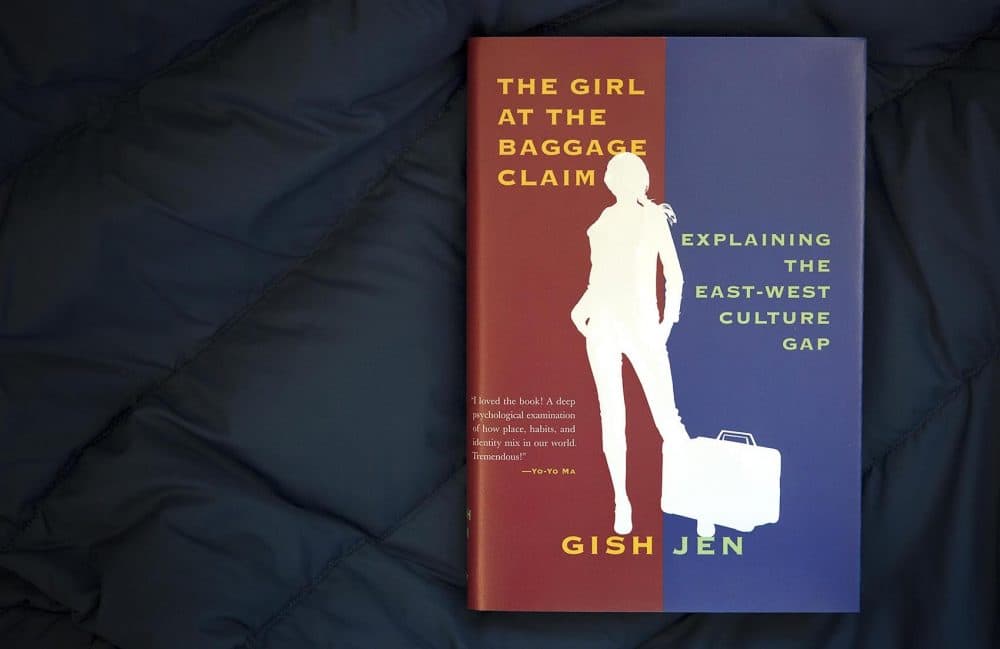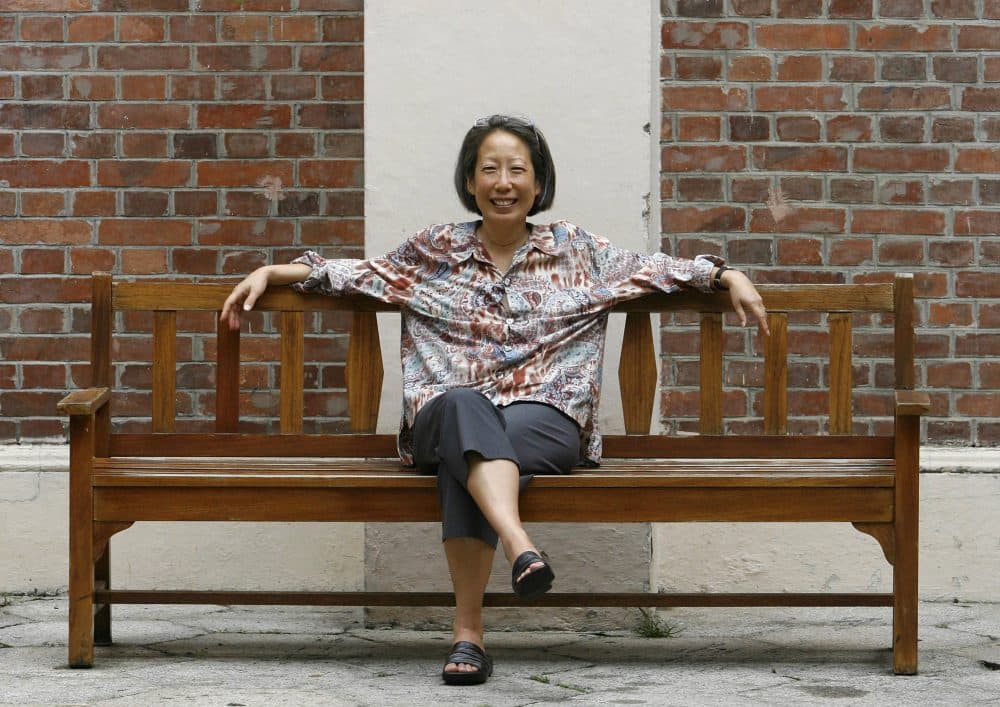Advertisement
Cambridge's Gish Jen Explores Chasm Between East And West In 'Girl At The Baggage Claim'

I’m on the phone with Gish Jen, writer, speaker and longtime Cambridge resident — and we’re talking about the Patriots’ incredible comeback at the Super Bowl a few weeks ago.
“How did they win? Individualistic people will say, ‘This is Tom Brady’s win, this man is a genius.’ But you could also argue that [without] Belichick — without that team — there’s no Tom Brady,” Jen muses. “Those are two very different ways of reading the same phenomenon. But what’s important, it seems, to me, is that you could always acknowledge that there’s another way of reading it, and I think that the problem is that if you are extremely individualistic, you might read it just one way.”
Football analogies aside, Jen’s reflections on the war of perspective between individualism and collectivism — how we see ourselves, our circumstances and society at large — feels particularly relevant in today’s social and political climate. Her new book, “The Girl at the Baggage Claim: Explaining the East-West Culture Gap,” grapples with the differences in identity that mark the persistent chasm between cultures despite continued globalization.
In an attempt that the author admits is much like trying to mark the shoreline, where “everything you draw is sure to be washed away,” Jen examines the ways we talk, the ways we think; how we form ideas and share them; how our relationships, expressions and ideas impact everything from art and education to business and politics.
"You can read about it, you can be told about it, but until you’re in it, I don’t think you really understand what America is."
Gish Jen
Though she’s known as a novelist and essayist to most, Jen writes this study, her second work of non-fiction, with an approachable fluidity -- managing to break down complicated psychological theory into a conversation on the intersections (and missed connections) of independent and interdependent cultures. It’s a conversation that, as a second-generation American of Asian heritage, I found especially, if surprisingly, relevant. The author, also a second-generation Asian American, goes on to reflect on the poignancy of her book for those who have grown up steeped in a culture completely alien to their parents.
“I realized that Asian Americans had this kind of issue that they couldn’t quite put their finger on,” Jen says. “I think it’s a little bit difficult to talk about. The culture is always tricky to talk about. But, I realized that because I am a novelist, because I do know how to tell a story, I realized that I could actually talk about it in a way that people would get it.”
The feeling she tries to describe can be difficult to put words to, but speaks to the perpetual examination of social and cultural belonging and the struggle to define identity experienced by many Asian-American children of immigrants.
“You can read about it, you can be told about it, but until you’re in it, I don’t think you really understand what America is. And then of course if you were born here, this is your country. Somehow, you have got to be able to put these pieces together,” Jen says. “This cultural strand is passed on. We are the product of thoughts. The nature of culture is to be invisible, it’s this way of establishing what’s 'normal,' so, you know, you’re not conscious of it.”
What many are left with, she explains, is a sort of ultra-awareness of the self brought about by American individualism, and a resulting journey toward understanding oneself through the disparities in culture and identity.

However, the appeal of Jen’s novel reaches far beyond the experiences felt by Asian Americans. Its examination of the relationship between our cultures and ourselves has the potential to resonate with any reader interested in self-reflection.
At the core of “The Girl at the Baggage Claim” is Jen’s examination of independent and interdependent selves, for which the author coins the term “flexi-self” and “big-pit self.” The flexi-self is "collectivistic." It seeks patterns over distinctions, in networks and systems, in making itself a meaningful contributor to a stronger whole. The pit-self, conversely, is as a “kind of avocado,” the author writes, focused fully on the large pit within itself that it protects and nurtures. This self is defined by the actions it takes to stand apart, to make itself known, to be deterministic, unique, self-reliant and wholly individualistic.
“I talk in the book the way that if you’re looking at a picture, and there is an object in the middle of the picture, people from one background will see the object, and people from another kind of background will be focused on the background and the relationship of the background to the object. It’s a very big difference,” she remarks. “We are not all living in the same reality. But in fact, our minds are filtering everything all the time.”
"We are not all living in the same reality. But in fact, our minds are filtering everything all the time."
Gish Jen
So, when we edit our realities, how do we find common ground? When our very cultural makeup seals us into unconsciously formed, yet self-created bubbles of experience, how can we hope to reach a globalized sense of understanding — or even an understanding across familial and generational lines?
“In a general kind of way, this book is written to the American audience,” Jen says. “And I would have to say it seems to me that mainstream America can make a bubble of itself. I think it’s incredibly important to understand that, and also to try to see life beyond that bubble.”
As she writes in “The Girl at the Baggage Claim,” our cultural identity makes us, in many ways “weird.” Individualism provides the cornerstone of that particularly American brand of by-the-bootstraps determination and a seemingly infinite drive toward innovation. Yet it also creates biases, narcissism and the kind of hubris that inevitably leads to ruin.
If the first step to bursting our bubble — to rising above forces that would seek to exploit the weaknesses of the pit-self — is to recognize that the bubble exists in the first place, then Jen’s latest work provides a fascinating and fulfilling place to start.
Gish Jen will appear at Harvard Book Store on Tuesday, Feb. 28; at Brookline Booksmith on Wednesday, March 1; and the Museum of Fine Arts on Wednesday, March 15.